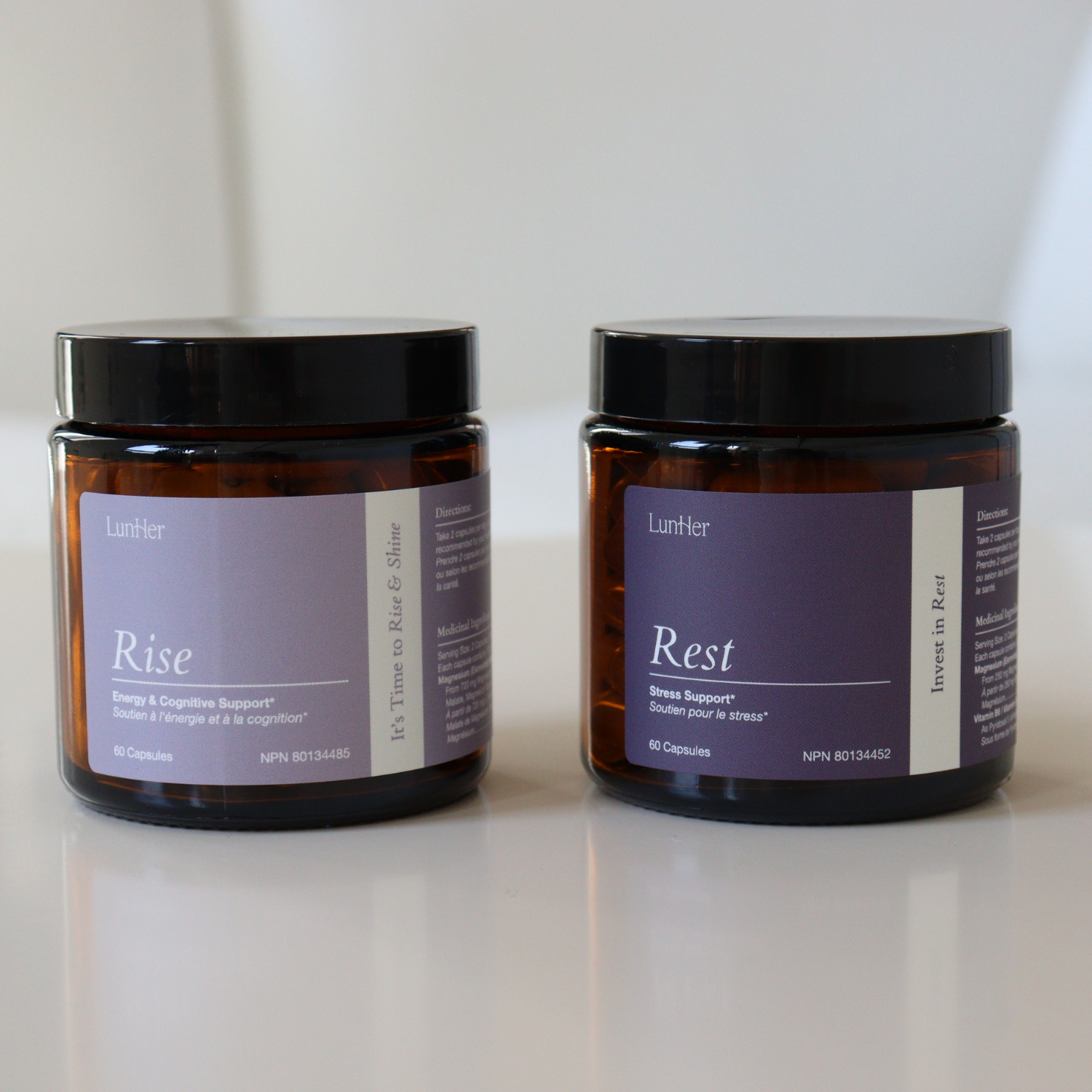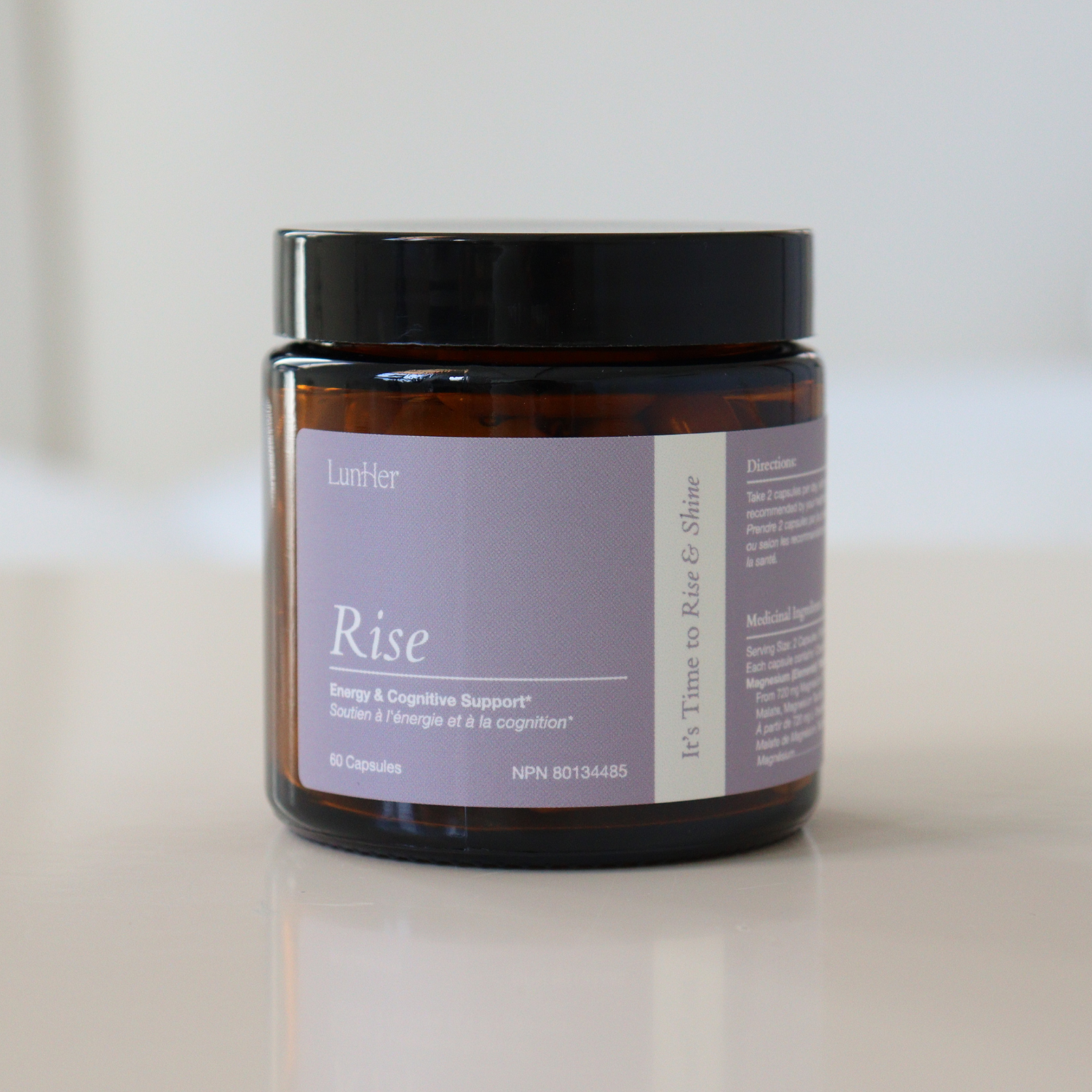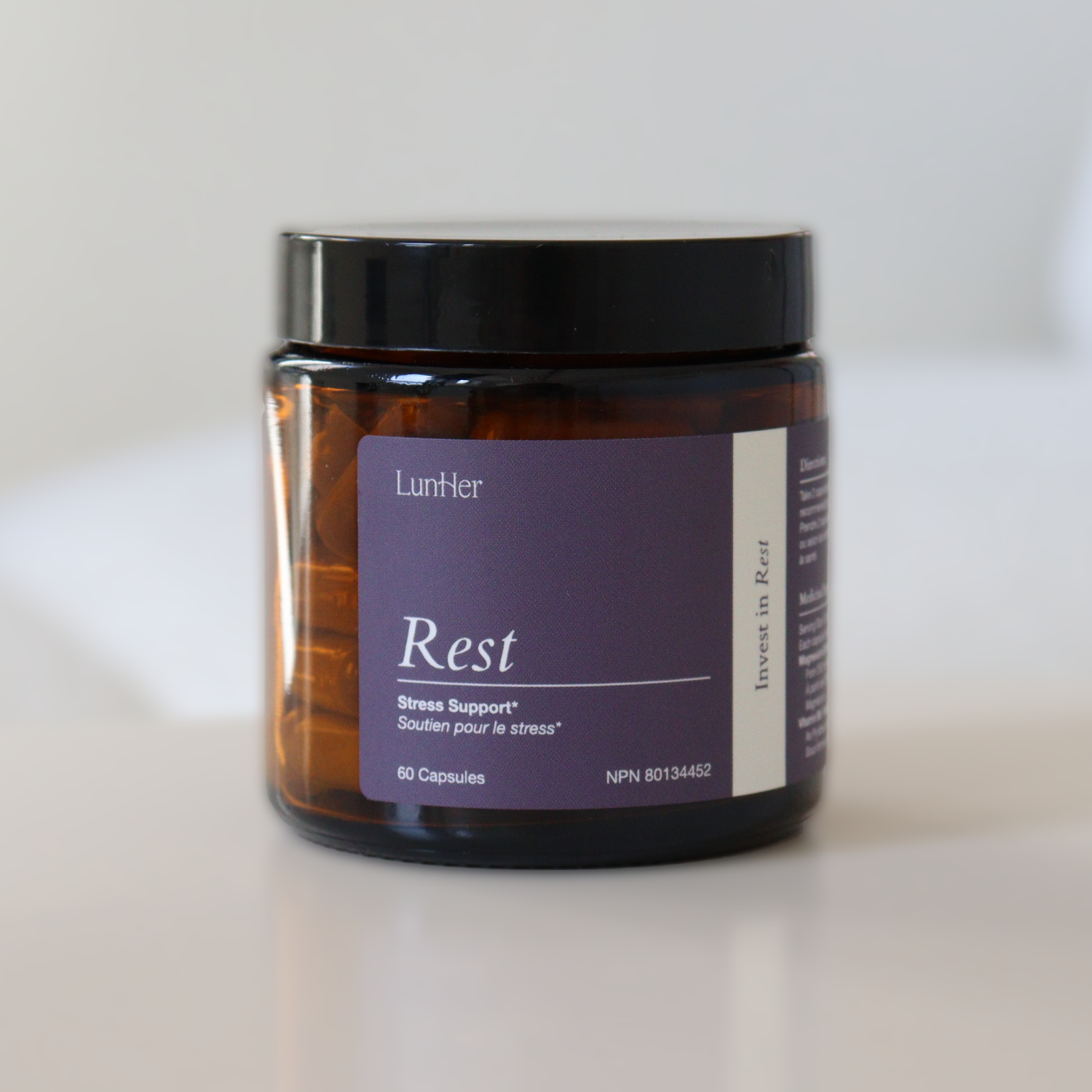Article: 13 Supplements to Manage Your Cortisol Levels

13 Supplements to Manage Your Cortisol Levels
Cortisol, your body’s natural stress hormone, can help you wake up, focus, and respond to challenges — it can be a powerful tool to enhance performance and energy levels. But when it stays elevated for too long? That’s when fatigue, burnout, hormonal imbalances and other health issues can start to show up. Learn more about how to manage cortisol levels to work for you naturally.
The LunHer Take
- Cortisol isn’t the enemy and is part of your body’s natural rhythm — but chronic stress can throw it out of balance. If you're constantly tired or overwhelmed, it’s a sign to explore what your body might be trying to tell you
- High cortisol over time can impact your sleep, mood, energy, hormones, and more
- Mindful lifestyle habits can be powerful tools to better stress management and resilience — movement, rest, breathwork etc
- Supplements like magnesium, rhodiola and probiotics may support your body’s stress response and help regulate cortisol naturally
What is Cortisol?
Cortisol, commonly known as the stress hormone, is released naturally by your body’s adrenal glands throughout the day. Its nickname comes from the fact that your glands release more cortisol in response to stressful situations. It also plays a role in managing metabolism, blood sugar levels, and even memory formulation. It also contributes to the regulation of the sleep-wake cycle.
Cortisol also plays a key role in your body’s ‘fight or flight’ response. When the body senses danger, it helps to prepare us for stressful situations. While cortisol is necessary for so many bodily functions, prolonged or chronic elevation of cortisol levels can have an array of negative side effects.
How do cortisol levels affect your mood?
Cortisol can have a significant impact on your mood. When cortisol levels are within a healthy range, they help maintain emotional balance and contribute to a sense of well-being. When levels are chronically elevated or imbalanced, it can have a negative effect on mood and mental health.
What causes high cortisol levels?
It’s important to note that high levels of cortisol aren't necessarily a cause for concern. Rising cortisol levels are a way for your mind to signal to the rest of your body that you’re dealing with a stressful situation. Your cortisol levels can also briefly spike after running or intense exercise. Natural cortisol levels are highest during the day and steadily decrease in the evening, as your body prepares for sleep.
If your cortisol levels are consistently high over a long period of time, this can be a problem. Excessive cortisol levels can wreak havoc on normal responses in the body. This is why being able to manage day-to-day stress is so important for mental and physical wellness.
The top 13 supplements for cortisol level management
There are many different supplements that can help regulate cortisol levels and manage stress. Here are 14 supplements that may help but keep in mind that the desired effect will vary for each individual.
1. Magnesium
During periods of elevated stress, your body’s magnesium levels can become depleted faster. Research studies have found that magnesium deficiency has been linked to an increased susceptibility to stress. Furthermore, individuals with high-stress levels tend to have lower levels of magnesium. All of this evidence emphasizes the importance of maintaining adequate magnesium levels to support the body's response to stress.
2. L-theanine
L-theanine is the most common form of the amino acid theanine. One study has shown that L-theanine can reduce stress and cortisol levels. It also promotes the secretion of neurotransmitters such as dopamine and serotonin. It’s naturally in green tea but you can also get L-theanine in supplement form.
3. Ashwagandha
Ashwagandha is an adaptogen which is a substance believed to help the body respond to various stressors. It has been part of Indian medicine for thousands of years and now there is scientific research to support claims of its effectiveness. Studies have shown that it can manage cortisol levels, resulting in reduced stress, and better mood. One study found that people who consumed ashwagandha extract saw reduced cortisol levels and a 44% improvement in mental health compared to the placebo group.
4. Probiotics
Probiotics are best known for their benefits for gut health. But did you know that your gut health can impact your overall mental and physical health? Your gut microbiome consists of trillions of microorganisms, consisting of thousands of different species of organisms. When you’re healthy, they all exist harmoniously in your small and large intestines.
Your body also has what’s called the “gut-brain axis,” which is a two-way communication system linking the emotional centers of your brain with your intestinal functions. Therefore, by supporting the health of your gut microbiome, probiotics contribute to the well-being of the gut-brain axis.
5. Prebiotics
Similar to probiotics, prebiotics also play an important role in nurturing gut health and possibly reducing stress levels. Prebiotics are a type of dietary fiber that serves as a vital energy source for beneficial gut bacteria. They fuel the growth and activity of these microorganisms, promoting a thriving gut microbiome. Preliminary studies have shown that prebiotics may have the potential to manage stress by influencing the cortisol awakening response, which is the natural rise in cortisol levels upon waking up. There is also strong evidence that prebiotics play a role in supporting digestive health through maintaining healthy bowel movements, boosting probiotics efficiency, and managing occasional bloating. However, more research still needs to be done.
6. Fish oil
Fish oil is a great source of omega-3s. Studies have shown that people with higher stress levels often have lower levels of omega-3s. Another study found that four months of omega-3 supplementation led to overall lower levels of cortisol during stress.
7. Bacopa
Bacopa is a nootropic herb that’s traditionally been used to support longevity and cognitive enhancement. One study found that participants reported an increase in emotional well-being after taking bacopa. Another study found that bacopa had adaptogenic effects and led to a reduction in cortisol levels compared to the control group.
8. Ginkgo biloba
Ginkgo biloba is another option for reducing cortisol levels and managing stress. Research has shown that it can help manage oxidative stress and support stress reduction but there is still additional research needed.
9. Rhodiola
Rhodiola is a supplement derived from the roots of the Rhodiola rosea plant. One of its major benefits is its ability to help manage stress and keep cortisol levels in check. A clinical trial demonstrated that rhodiola supplementation may effectively lower cortisol levels. Moreover, rhodiola supports a healthy response to occasional stress, while also promoting overall stress and mood management.
10. Maca
Maca is commonly used for its ability to enhance energy, stamina, and endurance. However, it is now being extensively studied for its anti-fatigue effects with promising results. Maca has also been shown to help manage oxidative stress and promote a sense of balance and well-being. Adaptogens like maca have been shown to be effective in managing stress as they help the body improve its resistance to it.
11. Phosphatidylserine
Phosphatidylserine (PS) is a phospholipid that is a component of our cell membranes. It’s responsible for protecting our brain cells and transmitting messages between them. It has also been shown to help reduce and manage exercise-induced stress. Studies have demonstrated that PS supplementation can help mitigate the negative effects of strenuous exercise on the body and support overall stress management. PS has also been shown to have positive effects on cognitive performance after induced stress.
12. Ginseng
Research has demonstrated that ginseng can aid in managing oxidative stress due to its strong antioxidant-like properties. One study found that after administering ginseng there was an increase in enzymes that boost antioxidant activity in the body. Additionally, a placebo-controlled clinical trial found that Koren red ginseng has a stabilizing effect on the sympathetic nervous system.
13. Chamomile
You may be familiar with chamomile tea, but chamomile can also be used in the form of essential oil for aromatherapy. Aromatherapy with chamomile essential oil has been shown to have a positive impact on stress levels, providing a gentle and natural approach to relaxation.
Other natural ways to reduce your cortisol levels
Supplements can help you manage your cortisol levels but there are also other stress management strategies you may want to try. Relaxation techniques such as deep breathing, meditation, gentle stretching, or even yoga are great options. You can also try listening to your favourite music or spending time outside. When it comes to mental health, it’s also important to ensure that you’re getting enough sleep and eating a healthy, nutrient-dense diet.
The Bottom Line
Cortisol is released by your body’s adrenal glands in response to stress. While it serves many useful purposes for your health, too much cortisol can lead to health problems. Incorporating any of the supplements listed above can help you manage stress and reduce cortisol levels. However, make sure you consult with a healthcare provider before taking any of these supplements and follow the recommended dosage. Keep in mind that supplements affect each individual differently so what works for someone else might not work for you. You can also reduce cortisol levels through lifestyle tweaks, including relaxation strategies, changes in diet, and improved sleep habits.




